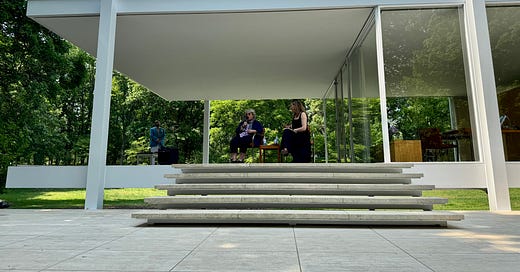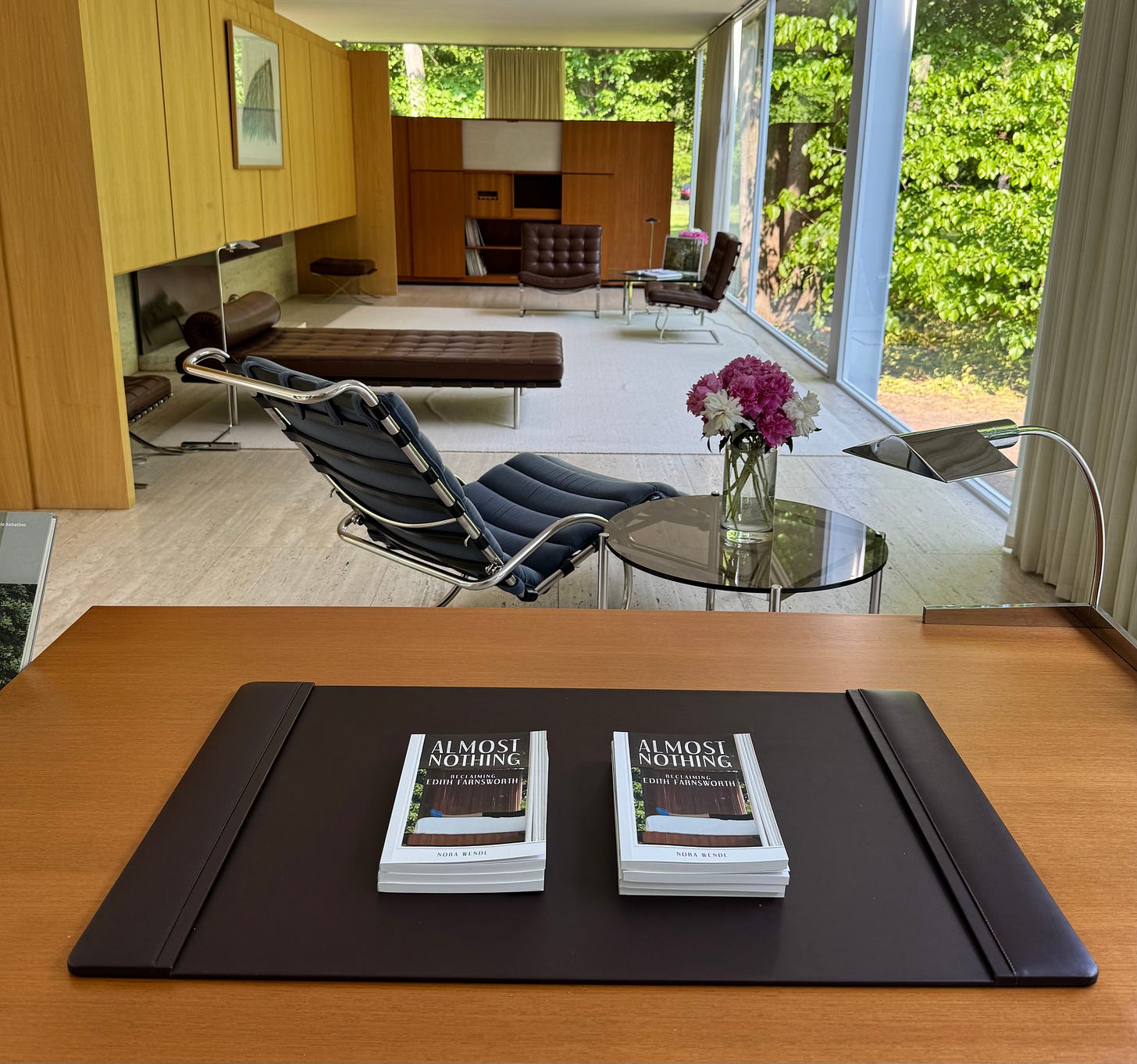A few days ago I took a short trip to Plano, Illinois, 90 minutes southwest of Chicago. There, friends, family, and supporters were gathered at the Edith Farnsworth House, a masterpiece of twentieth-century modern architecture, to celebrate the release of Almost Nothing: Reclaiming Edith Farnsworth, a new book by architecture professor and artist Nora Wendl.
It’s a book that, for the last month or so, as publication loomed, I’ve repeatedly confused my friends and my husband by referring to as “my book.” As in, “My Farnsworth House book is coming out soon! I’m so excited!”
To set the record straight: it is not my book. It is Nora’s book. But it is a book that I have been talking to Nora about, off and on, for … six years? Seven? And it’s a book that I acquired and edited for 3 Fields Books, the imprint I manage at the University of Illinois Press.
The work of an acquisitions editor is often opaque and hidden. What we do is not really comprehensible by any popular understanding of “editing.” Though this newsletter platform tells me I’m currently “editing newsletter,” we’re not writers. We’re also not assignment editors and we’re not copy editors, fact checkers, or proofreaders — though I do often do those things on a manuscript’s road to publication. Instead, we are listeners, strategists, negotiators, cheerleaders, and, of course, readers.
In publishing’s so-called golden days this all listening and negotiating happened over three-martini lunches in the Pool Room. Now it happens over Zoom, or maybe a cup of coffee. It’s a largely weird job, whose only clear returns — revenue for the press, prizes for the author — may be years away. At times the distance between those early conversations and a finished book feels so vague as to be unreal. What am I doing again?
But then, when you get to spend time on a gorgeous June day feeling just a sliver of the refracted glow from a proud author basking in her deserved glory, it all comes into focus. “Oh right,” I said to our publicist, also in attendance. “THIS is why we do it.”
Almost Nothing is a special book to me, which is why I’m hijacking my own newsletter to talk about it — something I don’t usually do. In it, Nora pulls off the truly unique trick of telling both the story of Edith Farnsworth, the wealthy Chicago doctor and single, unmarried woman who commissioned the house, with the story of her own ten-year quest to research and write the book, and to survive and thrive in academia. It is a book suffused with hybridity and ever-shifting subject-object relations, and one in which every single word is deployed with an artist’s precision. It’s also funny, intimate, feminist, and — to me, who likes to read weird, uncategorizable work like this— thrilling.
I’ve managed to get this far without mentioning the architect of the house, Mies van der Rohe, and that’s intentional. Mies designed the house, a house made of glass, for Edith, and their early warm collaboration and late angry schism —Edith furious about cost overruns, Mies angry that she wasn’t paying his bill — has been written into the long history of the house. In those histories, Edith is cast as a bossy, homely spinster, taking her revenge on Mies after their friendship, long rumored but never established to be romantic, had ended. Never mind that she was a brilliant, pioneering doctor, an accomplished violinist, a poet. Never mind her long, intimate friendships with other women. She had the temerity to insist on what she wanted — things like curtains, to offer a single woman in a glass house in the country a bit of privacy — and for this she has been for decades disparaged as interfering with genius.
Nora’s project was to recover Edith from the shadows of history and to restore her to the center of the story of her house. To set the record straight, even as the record — as set down in Edith’s unpublished memoirs — offers no clear answers to questions about her motivations or her inner life. At the event at the house Nora, in conversation with historian Alice T. Friedman, noted that Edith was a dignified woman, one not prone to oversharing. In life and in her memoirs she allowed herself to remain an enigma. Asked what question Nora would ask Edith if she were able, Nora answered without missing a beat: “Were you quiet or were you silenced?”

Last week, and relevant to the ongoing conversation about journalism, book reviews, and artificial intelligence, I came across a writeup about the book on a suburban-Chicago events website. I wouldn’t call it a “review,” as it didn’t deliver any analysis. It couldn’t, because it was clearly written by an AI tool, and mentions Edith exactly once. Instead this authorless content, presumably trained on the existing Mies-centered writing about the house, consists of five paragraphs on the great man and his work and legacy. It didn’t even get the subtitle right, calling it instead “Almost Nothing: The 20th-Century Life and Architecture of Mies van der Rohe.”
That a robot-generated description of a book exploring how an independent woman gets erased from history, that took another woman ten years to write and see published, should so completely erase the woman in question, and authorship, from the picture was an irony almost too brutal to bear. I didn’t know whether to laugh or cry. I kind of still don’t.
At the event I met a friend of Nora’s, novelist Alexis Smith, who had also been reading drafts of the manuscript for years. “Oh!” she said, “you’re the other person who realized this was a book!” We both laughed. Because that, in a nutshell is what readers do, that AI can never accomplish. We recognize that something is a book, not a regurgitated iteration of conventional wisdom, misinformation, and bias. If artificial intelligence is the latest agent out there reinforcing the patriarchal narrative, individual women writing and publishing against the grain are a way through the glass.
If you’re in Chicago, Nora Wendl is reading tonight (June 4), and in conversation about the book with journalist and critic Anjulie Rao, at the Newberry Library at 6 pm.
And speaking of women writing women’s stories, and speaking about their writing, we have a little tour!







Bravo. Mies needs a hard critique (they all do), and all of these stories are in desperate need of context. I listened to an interview recently with author Eva Hagberg who wrote a book about Aline Louchheim Saarinen's role in the success of her husband Eero. Unsurprisingly, she was a absolute dynamo who gave up everything to bet on and elevate her husband. Excited to read this book about Edith!
Oh, I'm excited to read this!